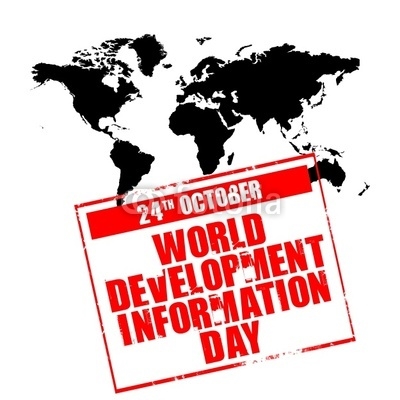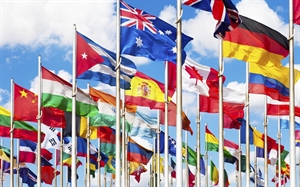World Development Information Day 2024 is on Thursday, October 24, 2024: What is information technology?
Thursday, October 24, 2024 is World Development Information Day 2024.
As an Amazon Associate I earn from qualifying purchases.

In the 1960s and 1970s, the term information technology (IT) was a little known phrase that was used by those who worked in places like banks and hospitals to describe the processes they used to store information. With the paradigm shift to computing technology and "paperless" workplaces, information technology has come to be a household phrase. It defines an industry that uses computers, networking, software programming, and other equipment and processes to store, process, retrieve, transmit, and protect information.
In the early days of computer development, there was no such thing as a college degree in IT. Software development and computer programming were best left to the computer scientists and mathematical engineers, due to their complicated nature. As time passed and technology advanced, such as with the advent of the personal computer in the 1980s and its everyday use in the home and the workplace, the world moved into the information age.
By the early 21st century, nearly every child in the Western world, and many in other parts of the world, knew how to use a personal computer. Businesses' information technology departments have gone from using storage tapes created by a single computer operator to interconnected networks of employee workstations that store information in a server farm, often somewhere away from the main business site. Communication has advanced, from physical postal mail, to telephone fax transmissions, to nearly instantaneous digital communication through electronic mail (email).
Great technological advances have been made since the days when computers were huge pieces of equipment that were stored in big, air conditioned rooms, getting their information from punch cards. The information technology industry has turned out to be a huge employer of people worldwide, as the focus shifts in some nations from manufacturing to service industries. It is a field where the barrier to entry is generally much lower than that of manufacturing, for example. In the current business environment, being proficient in computers is often a necessity for those who want to compete in the workplace.
Jobs in information technology are widely varied, although many do require some level of higher education. Positions as diverse as software designer, network engineer, and database administrator are all usually considered IT jobs. Nearly any position that involves the intersection of computers and information may be considered part of this field.

A socially conditioned world?
"cockblocking the economy" I think this is the most perfect phrase to describe what is happening now in this world.
I agree with a lot of what you said.
I am 20, too, and have been thinking about basically the same thing as you. It's a bit different because you're in Belgium and I'm in the U.S., but the underlying problems are all the same. There are too many greedy people at the top of the food chain. There are too many people who only care about money. There are too many people who get overpaid. I feel like so many people are conditioned to live a hamster wheel existence, instead of really thinking about what their true calling is to contribute something to make this world a better place for the whole. Like you said, they work under big companies to get the paycheck, instead of working to make change and discover new and greater things. I think more young people are realizing this.
I think on an individual basis, people need to learn the rules of the world before they are able to break them and change them. This comes with educating ourselves, whether that be through school, through free sources like the internet and library, and anything else that can teach you more about what is happening in this world. By being more aware of the problems and causes, we can find more ways to figure out solutions.
The second thing that people need to do is to stop going with the flow. More people need to pause like you and I and stop to think about whether it's really okay to keep going this safe route to live a life that is based on financial security. More people need to pause and think about what they really want to do, that is beyond money and beyond themselves. More people need to think about the changes they can bring to this world with their unique talents, experiences, and knowledge. More people need to think about the things that can be improved instead of accepting it for what it is.
Then we all have to just work together and support each other with our plans and ambitions. We need to be open to opportunities that can bring about change. We need to be supportive of companies that do bring improvement to this world.
And with social media websites and the internet, it's easier to make connections with people who have the same visions of bringing improvement, so I don't completely think that the internet is such a bad thing at all.
A part of me also is not completely lost because I know that a lot of people these days are working harder to bring about change. Look at companies like Google, they help to bring so much free information and knowledge to everybody-and by doing so they are making education and the truth of the world more accessible. I can't say this world is completely messed up because I know there are so many good people in this world who do want to make a difference. I think it's important to focus on the good people of this world, and connect with them and work with them.

Information about paracosms?
Etymology
para- + cosmos
Noun
paracosmos (plural paracosmoses)
(rare) The realm of imagination; an imaginary world.
1961, The American Journal of Psychiatry, Volume 117, page 96:
Day dreaming and fantasies which are flights into the paracosmos, are an antithesis of creativity which is the most intense land of action.
1975, Molière and the Commonwealth of Letters: Patrimony and Posterity (eds. Roger Johnson, Editha S. Neumann, & Guy T. Trail), University Press of Mississippi (1975), page 421:
More simply stated, the paracosmos reflects a writer's interest in examining a (generally) rather small number of persons, or types of persons, in a variety of circumstances and relationships: he has marked out a portion of the world as his own and works upon it to make it his.
2011, Claire Golomb, The Creation of Imaginary Worlds: The Role of Art, Magic and Dreams in Child Development, Jessica Kingsley Publishers (2011), ISBN 9781849058520, page 80:
Such artists tend to create an imaginary world, a paracosmos where good and evil are starkly represented, where evil powers always challenge the good ones and need to be vanquished time and again.














